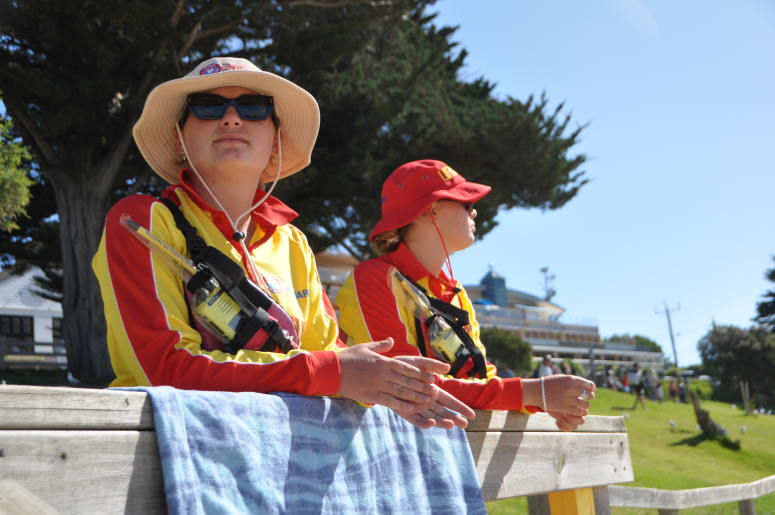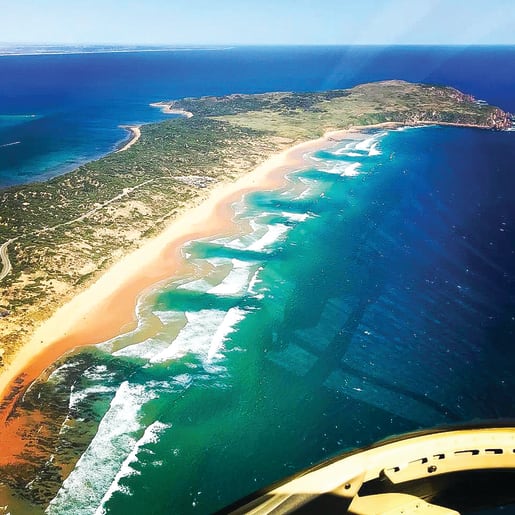
From Boxing Day, Woolamai, Smiths Beach and Cowes foreshore beach will have lifesavers on duty, from 10am – 6pm, seven days a week.

Can you spot a rip? An aerial view of rip currents along Woolamai Beach. There are dangerous rips at many of Phillip Island’s ocean beaches, so swimming on an unpatrolled beach can be deadly. Photo: Phillip Island Helicopters.
Woolamai Beach Surf Life Saving Club (WBSLSC) patrols are operating over summer, to keep everyone safe in the water.
Woolamai and Smiths Beach are both currently patrolled from 10am – 6pm during the week.
On Saturday, Woolamai patrols start at 10am and finish at 5pm, while Smiths Beach patrols run from 10am – 6pm. On Sunday, Woolamai patrols will finish at 4pm, while Smiths will again be patrolled until 6pm.
From Boxing Day through to January 26, Cowes foreshore beach will also have lifesavers on duty, with all three beaches patrolled from 10am – 6pm, seven days a week.
“With the summer holidays upon us, WBSLSC would like to remind everyone to stay safe around the water,” said Ryan Box, the club’s director of communications.
“Please make sure you swim between the flags and know your limits, and have a chat to one of our friendly lifesavers or lifeguards who will be able to give you more information on the conditions.”
Any changes to the patrol schedule will be shared on Facebook @WoolamaiBeachSLSC.
Ryan encouraged all beach goers to look at the signage displayed before going into the water.
Safety
Life Saving Victoria area lifesaving manager east region Hannah Tzimokas also said beach goers needed to take care in the water.
“We are excited to welcome visitors and locals alike to Phillip Island’s stunning beaches this holiday season, but safety must be front of mind whenever you are in, on, or around water.
“The easiest decision you can make to prevent festivities from turning into fatalities is to swim between the red and yellow flags at a patrolled location, such as Woolamai Beach Surf Life Saving Club, Cowes or Smiths Beach, where lifesavers or lifeguards can keep an eye on you and any potential risks, including rips, and help if you find yourself in trouble.”
Ms Tzimokas said it was important not to swim alone and to make sure children were always supervised around water.
“In addition to swimming between the flags, remember to always swim with a friend and actively supervise children, which means always keeping under-fives within arm’s reach and under-tens in your constant and direct eyeline, without distractions such as checking your phone or ducking off for a coffee.
“Finally, if you are celebrating the holiday season with an alcoholic drink, it is imperative you only do so after you have finished all aquatic-related activities.
“In the past decade, 34 per cent of fatal drownings were known to involve alcohol or other drugs.”
Each year over 50 people are rescued from the surf at Cape Woolamai, with the island’s ocean beaches claiming at least seven lives since January 2016.
The start of a new year is always a dangerous time in the water.
According to Life Saving Victoria, five people drowned in the first two days of 2022, with half of the drownings in 72 hours involving children aged 0 – 14 years.
In addition to the fatalities, lifesavers rescued 44 people in 72 hours – each of which could have had a very different outcome if lifesavers weren’t there.
For any questions about the local patrol times or other general beach safety questions, please contact WBSLSC on Facebook @WoolamaiBeachSLSC or Instagram @woolamaislsc.
For more information about the club visit www.woolamaibeach.org.au
To find your nearest patrolled location, head to beachsafe.org.au.
Rips
There are dangerous rips at many of Phillip Island’s ocean beaches, so swimming on an unpatrolled beach can be deadly.
At the start of December, local surfers rescued five people from a rip at Berrys Beach
According to research by Surf Life Saving Australia, most Australians don't know how to spot a rip, and two out of three people who think they can get it wrong.
“Rips can overcome even the strongest swimmer,” said Ms Tzimokas.
“While the best way to avoid being caught in a rip is swimming between the flags, there are also visual cues that can indicate a rip current, such as fewer breaking waves, dirty or discoloured water, dark patches of water, or sand or debris floating beyond the surf zone.
“A rip is unlikely to pull you under the water, but it will pull you out – and it can do so with surprising force.
“If you do find yourself caught in a rip, try to remain calm.
“Raise your arm to alert lifesavers or beachgoers that you’re in trouble, and then let the rip take you out while you wait for help. When it releases you, use the breaking waves to come back to shore.
“Alternatively, you can swim parallel to the shore until you’re in the break zone, then use those waves to take you back in.”
Rock fishing
Sadly, San Remo and Phillip Island are known as blackspots for drowning in Victoria, including fishers being washed off rocks.
In January 2022, a woman drowned after being washed off the rocks near the George Bass Coastal Walk and Punchbowl Road.
At the start of 2020, a fisherman was killed when he was washed off the rocks at Punchbowl Road, the third such death in four months. Since 2000 there have been seven deaths of anglers at Punchbowl, which represents a third of all rock fishing deaths in Victoria in the last two decades.
In October 2021 it was announced that two popular San Remo fishing locations – Punchbowl and the rocks at the southern end of Potters Hill Road – would be included in a trial into fishing safety, requiring fishers to wear lifejackets when fishing.
The Victorian Fisheries Authority (VFA) said tragically many rock fishers have died after being swept off coastal rock shelves and the evidence was irrefutable that wearing a life jacket substantially reduced the risk of drowning if a fisher is swept off the rocks.





